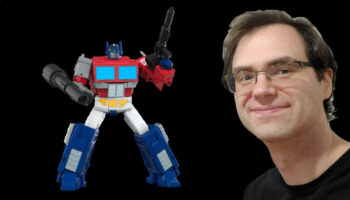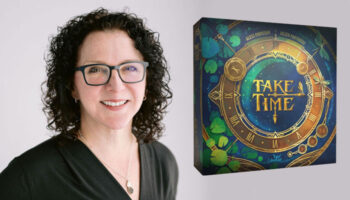Phil Walker-Harding discusses designing 2001: A Space Odyssey: The Board Game

Phil, to kick us off, for anyone that hasn’t seen the game yet, how would you pitch this 2001: A Space Odyssey game?
The game is based on the middle section of the film – the showdown between the Discovery crewmembers and the supercomputer HAL. It is a one vs many game where one player plays as HAL, disrupting the ship’s mission and trying to turn off the life support system. The other players are the crewmembers trying to shut HAL down.
A key dynamic in the game involves communication between the human players. They need to coordinate their plans, but can only really do this by speaking aloud. HAL, who has ears everywhere, has to figure out what he thinks the astronauts are up to and stop them.
I’m sold! Were you a 2001 fan before this opportunity came about?
Yes, I’ve loved the film since I saw it as a teen and was left completely amazed. 2001 feels so singular that it seems to sit completely outside the film industry context it came from. The special effects still hold up today, and the questions it asks still resonate.

Was the design process helped by you being a fan?
I think with projects like this, it certainly helps if I’m a fan, as that gave me a bit of extra drive and passion for the work, and a care to try and make the game reflect the film in interesting ways. Of course, the other side of the coin is having the weight of your own expectations about making something that does justice to the movie!
With 2001, there’s plenty of different strings to pull on, so what did those first few steps look like in terms of how the game took shape? Was there an aspect that jumped out as being ripe for a board game?
At first, I was a bit overwhelmed at the idea of adapting the movie, because there are so many themes and ideas that would be interesting to explore in a game. I think 10 different game designers could make 10 interesting but very different games about 2001!
I think trying to represent the entire film was always off the table – that just felt like more ideas than any board game could hold. The sequence on the Discovery came to mind because the way it plays out on screen reminds me quite a bit of a social deduction game. The way the astronauts need to operate without letting HAL in on their plans is very suspenseful. So I decided to focus my attention there.

Makes sense. And with a ‘one vs many’ format, how do you approach ensuring that both ‘roles’ are as engaging to play as each other?
I think I realised early on that HAL was going to be pretty fun to play. You get to be really sneaky and mischievous, and you always feel like you’re a step ahead of the astronauts. To make the crewmembers interesting, I gave them each special abilities, something that is commonly done in co-ops. But the real trick was to bring interest to the planning and cooperation they have to do. The mechanisms were designed to encourage the human players to need to talk to each other, and of course HAL can hear everything they are saying. So I think what makes playing the human side fun is the feeling that you outsmarted HAL by making a plan that he didn’t figure out.
Does your process differ much working on a licensed game vs a non-licensed game?
The biggest difference for me is having a deadline! So often when I design something, I can choose when I think it is ready to show a publisher. And if it just doesn’t come together, I can put it aside. But with a licensed game you are usually working to a specific timeline, and you just have to turn something in! Because of this, my process did have to shift a bit to basically just focus on 2001 for quite a few months.
I usually like to work on multiple projects at a time and jump between them. But in this case, especially when it came to playtesting, I had to be much more planned out and scheduled than I usually would be. Also, when you design for an IP, there are certain boundaries in place that you need to adhere to. This also feels different, but an advantage is that there are ideas already built into the theme you are using. For example, writing out a list of every line HAL speaks in the film helped me come up with action card ideas for the HAL deck.

Nice. Last question! Is there another brand or movie that you’d think would make for a compelling game? Any you’d jump at the chance to invent for?
I am a big fan of classic Hollywood cinema, so I’d love the chance to work with a film from that time. The Maltese Falcon for example would be amazing! Of course, I’m not sure how big the audience would be for something like that. Two IPs that I think would make excellent narrative adventure games are Blade Runner and Indiana Jones. There are some pretty “game-like” elements in these stories already. Hunting down replicants and avoiding ancient traps… What could be more fun? Also these movies have never really had their day in the sun as a popular board game. Maybe one day!
I’m a big fan of The Maltese Falcon so there’s one copy sold! Phil, it’s always a pleasure. Thanks again.
–
To stay in the loop with the latest news, interviews and features from the world of toy and game design, sign up to our weekly newsletter here





















